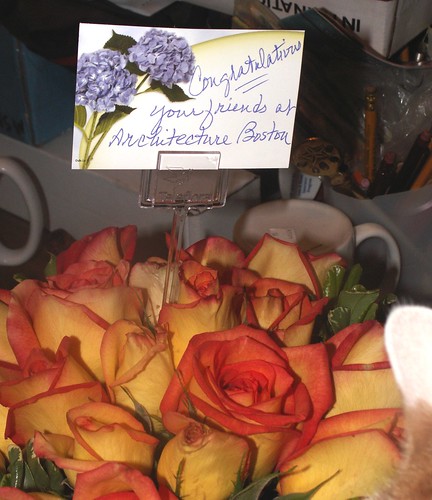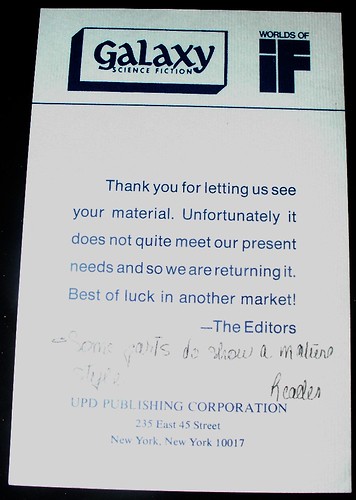In Deep Appreciation

Mary and I were watching The Longest Day when the doorbell rang. She's expecting a chair delivered, but we didn't think it would come on a Saturday.
When I answered the door I was greeted with 21 roses set in a large open glass cube. (Our cat Daisy investigates at lower right. Mary "got" the number immediately -- said they were a "21-bud salute.") They were addressed to me. My eyes widened because I had no idea who might have sent them. I signed for the delivery, then put on my reading glasses before I opened the envelope to find out....
They came from Architecture Boston, one of my clients. I've been transcribing interviews and roundtable discussions for AB for years -- I think since the magazine first began. The other day I let the folks there know that I'd signed a book contract for Covenant, the first volume of my trilogy Deviations. (More information on Deviations is here.)
I've always felt my freelance work is better than a free education because it's an education I get paid for. My degrees are in psychology. Not surprisingly, my writing is largely character-driven. Although I've had no direct "translation" into fiction of the material I get from AB, I like to think I've picked up a certain architectural sensibility that finds its way indirectly into my writing. In one scene in the second volume, my protagonist gauges where she is based on the shape of the buildings around her.
My comments in response to the material I transcribe have being published in the magazine a couple of times: once in a sidebar to a photograph, and once in a letter to the editor.
I was floored, though, by these roses! And by the kind gesture made by my friends at AB.
I'd held my first paying job at age 16, the summer after I graduated high school (I was precocious). But I've had a certain professional stiffness about me since early childhood, when I was taught how to answer the phone and take messages. By the time I was eight I was helping my mother grade papers submitted by the students in the inner-city high school where she taught English.
Even before then, probably when I was around kindergarten age, I helped her produce and collate exams. In those days she used a hectograph, which meant mixing a gel and letting it solidify in a pan. We lay specially-inked paper on the gel to create a reverse print, then lay plain paper sheets on the reverse print to create doubly-reversed copies.
If ditto machines were primitive, hectographs were downright prehistoric. Our dinette table became our print shop.
I temped through college when I wasn't working as departmental secretary. I've always had an impressive typing speed because when I was about ten years old I taught myself on an old Smith Corona manual, not to do office work but to submit my stories. Between that and inheriting genes from my pianist father, I had pretty good manual dexterity.
From the summer of 1975 on there was hardly a time when I didn't work. I was a teaching and research assistant in grad school, and I worked in lower Manhattan while writing my thesis. When I moved from New York to Massachusetts I signed up with a temp agency before I signed my lease. From 1983 on I juggled my day job with freelance work except for when I freelanced fulltime: 1988-1990 and 2003 to the present.
Going beyond the formality of a business relationship has always been a challenge, but little by little I've been learning to loosen up. The same goes for publishing, which is sometimes even more of an enigma to me. I expect my corporate writing and editing, my transcribing, etc., to be commodities. My emotional attachment is not to the product but to the level of service I can give.
My creative output, especially writing, is far different. If I'm a stiff, staid "adult" in the business world, I'm a little kid (one might argue a naive little kid) in the creative one. I am easily awed, and that often makes me shy -- though once I pass that barrier I can yak it up with the best of them. I had to push myself to write to people I'd been out of touch with for decades, and I'm still trying to articulate to myself why I've felt so intimidated by this.
It's like anything else: Habituation comes with practice. Submitting is not the problem. I started submitting poetry and fiction in the 70s, had my heyday in the 80s, and am now starting to get back up to speed.

My very first rejection slip (not this exact one) came from Galaxy, which was also the first science fiction magazine to which I ever subscribed. I think I was a high school freshman at the time, which would have made the year 1972-1973. My reaction to the rejection was that this now made me a real writer! As a minor with a very limited budget back in my high school days, I had sent everything, including the self-addressed stamped envelope, by fourth class mail. That taught me patience.
I treasure these things, and appreciated the note ("Some parts do show a mature style") left by the reader on the rejection shown here. Far from being discouraged, I just kept on submitting. Galaxy is no longer publishing, but I've had stories in Asimov's (Nov. 1984, mid-Dec. 1986), Amazing (May 1988), Full Spectrum (Bantam Books, 1988), and various smaller publications.
Twenty-plus years ago I made a bit of a splash and was like a deer caught in the headlights. To mix metaphors, it was as though I stood at the door of a house, knocking quietly for years. Then suddenly the door opened wide and I was swept up in a din of shouting and noisemakers -- which made me run screaming in the other direction.
It didn't help that I was working so hard to keep a roof over my head that I had few brain cells left for crafting. Not that I didn't try. But that created a very unpleasant split in me: How could I respond to editor solicitations when I was overloaded with grunt work, working in two departments at once (I did that for two different employers), and freelancing on top of that because I wasn't being paid for overtime? Add onto that the dual existence (in the 80s) of getting fan mail on the one hand while being called, literally, "the lowest of the low" on the other, by a supervisor who shall remain unnamed, because I was support staff.
Now I'm in a position where I can devote more time to crafting again, so I'm keeping my fingers crossed that I can make another go of this. Produce materials, gather them together, send them out ("Fly away, little poems! Be free!"), see if they can find a home. One of my goals for the coming year is to get back into the submissions groove. I've already done a bit with state and national contests and have a few new publications under my belt, but I plan to start doing more. It's just a question of lining up my priorities.
Meanwhile, I've been:
1. Going through my manuscript and tweaking according to publisher specs: namely, changing from present to past tense and breaking up the chapters a bit more.
2. Preparing and printing announcements to mail to friends, family, clients, etc.
3. Writing a couple of articles solicited by two magazines (the second a result of my re-establishing old contacts), both of which have been accepted (ya gotta love e-mail!).
4. Writing letters to connect with a couple of folks in publishing, whom I knew in the 70s and 80s.
I've put several entries up at Open Diary that I haven't transferred here, mainly because the OD format is more accommodating of photo width:
1. Step Forward, my first published poem in 1972;
2. All The Pretty Horses, painted horse sculptures in the center of Ocala, Florida; and
3. Ocala's Historic Buildings.











2 Comments:
Beautiful roses; incredible support. It is like a birth, isn't it. Congratulations, again! xo
I love the line about freelance writing and education! I enjoyed reading about you publishing history. Keep us posted on the publication of your book.
PS I also loved the poem you wrote at 13 and it was a good example of your innate talent.
Post a Comment
<< Home